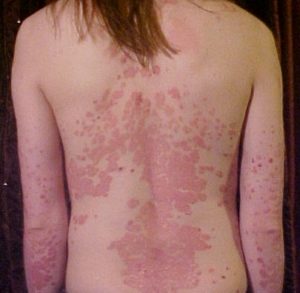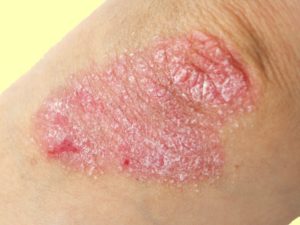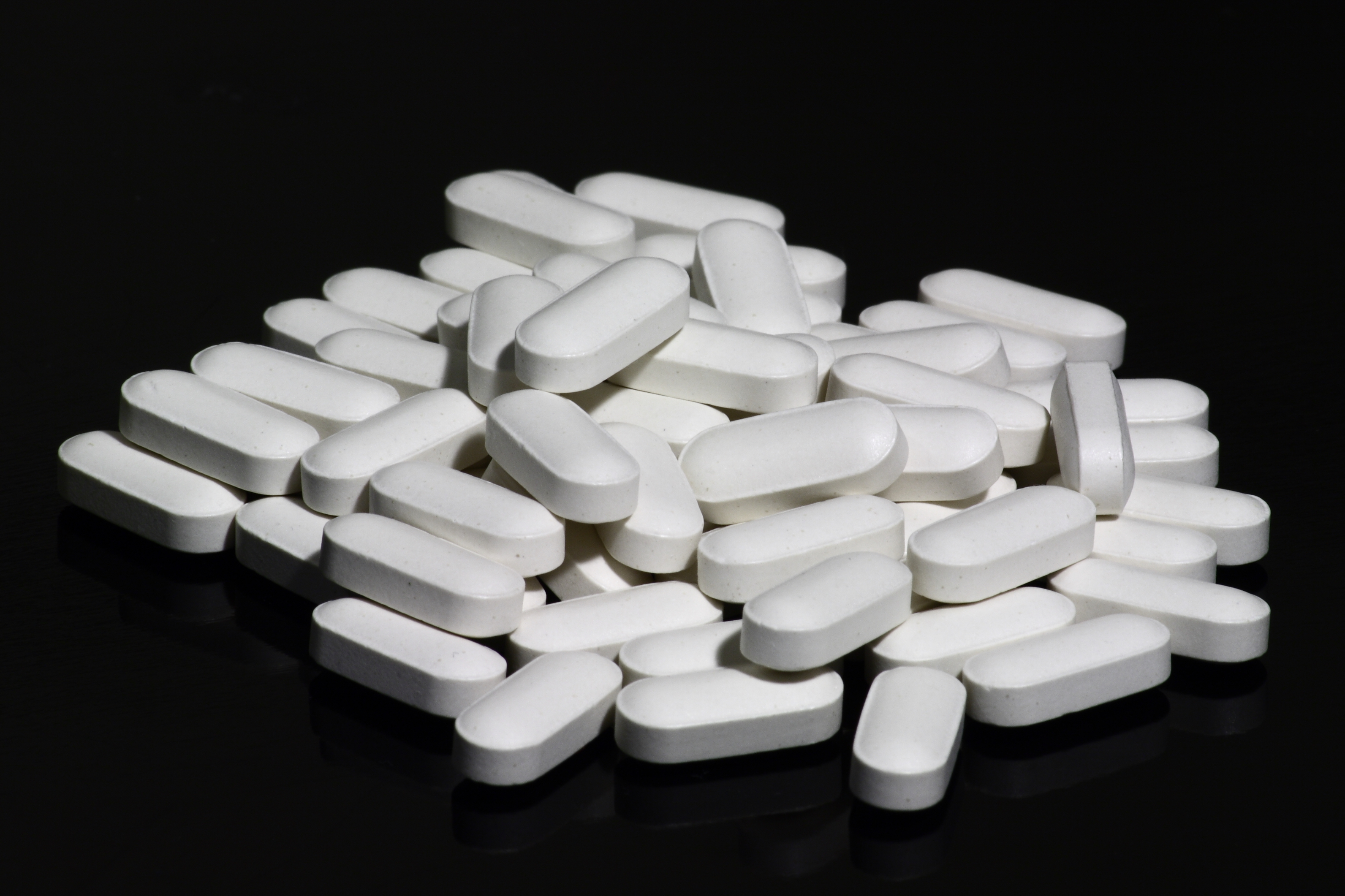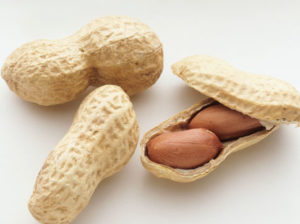 Could probiotics have a role to play in the treatment of psoriasis? A recent analysis and review of studies suggests that they might. Psoriasis is a non-contagious, chronic disease affecting about 2 to 4% of the population, and which is characterized by patches of abnormal skin. These skin patches are typically red, itchy, and scaly, and can cover small areas to covering the entire body. There is no cure for psoriasis, but various treatments can help control the symptoms, such as steroid creams, vitamin D3 cream, ultraviolet light, and immune system suppressing medications.
Could probiotics have a role to play in the treatment of psoriasis? A recent analysis and review of studies suggests that they might. Psoriasis is a non-contagious, chronic disease affecting about 2 to 4% of the population, and which is characterized by patches of abnormal skin. These skin patches are typically red, itchy, and scaly, and can cover small areas to covering the entire body. There is no cure for psoriasis, but various treatments can help control the symptoms, such as steroid creams, vitamin D3 cream, ultraviolet light, and immune system suppressing medications.
What did the researchers find? They said that "new evidence suggests that the microbiome may play a pathogenic role in psoriatic disease" - meaning the community of microbes (microbiome) may be involved in this disease. There is dysbiosis of the skin microbiome (microbial community is out of whack) in areas of skin lesions or patches. Areas of skin lesions had a different microbiome ("lesional psoriatic microbiome") compared to healthy skin - and in these skin lesions or patches some microbial species increase which leads to a decrease or elimination of others. Not just differences in bacteria, but also in fungi and viruses.
in psoriasis the microbial community of the gut is also out of whack (dysbiosis of the gut microbiome). And the gut microbiome is different in those with psoriasis limited to just skin patches, and those with complications of psoriasis (e.g., psoriatic arthritis) - and several studies found that these shifts in the gut microbiome occurred before the psoriatic complications became evident. That suggests that probiotics might help. But which ones?
The researchers state: "Other changes observed in gut microbiome studies include a decrease in Actinobacteria. This may suggest a protective role of Actinobacteria, a phylum which includes Bifidobacterium species that have been shown to reduce intestinal inflammation, suppress autoimmunity, and induce Tregs." They go on to state that one 2013 study by Groeger et al demonstrated that eating Bifidobacteria infantis 35,624 for 6–8 weeks in a randomized, double-blind, placebo-controlled clinical trial reduced inflammatory markers (plasma CRP and TNF-a) in psoriasis patients. Bifidobacterium species, including B. infantis, are commonly found in many multi-strain supplements. So I wonder, what happens if people with psoriasis take them over an extended period? Will the skin psoriasis skin patches improve? This is currently unknown. But...If you've had success with probiotics as a psoriasis treatment - please let me know. What microbes? And for what symptoms of psoriasis?
From Current Dermatology Reports : The Role of the Skin and Gut Microbiome in Psoriatic Disease
Our review of studies pertaining to the cutaneous microbiome showed a trend towards an increased relative abundance of Streptococcus and a decreased level of Propionibacterium in psoriasis patients compared to controls. In the gut microbiome, the ratio of Firmicutes and Bacteroidetes was perturbed in psoriatic individuals compared to healthy controls. Actinobacteria was also relatively underrepresented in psoriasis patients relative to healthy individuals.
Summary: Although the field of the psoriatic microbiome is relatively new, these first studies reveal interesting differences in microbiome composition that may be associated with the development of psoriatic comorbidities and serve as novel therapeutic targets.
 Psoriasis. Credit: Medscape
Psoriasis. Credit: Medscape

 Surprised...is how I felt after reading this study. According to
Surprised...is how I felt after reading this study. According to  Again, another study finds that taking supplements is not always best for health. Many studies find that eating foods with vitamin "X" is beneficial, but taking high dose supplements may be linked to health problems (
Again, another study finds that taking supplements is not always best for health. Many studies find that eating foods with vitamin "X" is beneficial, but taking high dose supplements may be linked to health problems ( Could something as simple as giving a probiotic and a sugar for 7 days prevent sepsis in babies? Sepsis is a life-threatening infection that is a HUGE problem in developing countries such as India. It is a major cause of death in babies throughout the world, even with antibiotic treatment. So this new research (done in India) finding that giving newborn babies a probiotic plus the sugar fructooligosaccharide (FOS) for only one week had the result of lowering the incidence of sepsis and death by 40%, and also infections is huge news. A game changer.
Could something as simple as giving a probiotic and a sugar for 7 days prevent sepsis in babies? Sepsis is a life-threatening infection that is a HUGE problem in developing countries such as India. It is a major cause of death in babies throughout the world, even with antibiotic treatment. So this new research (done in India) finding that giving newborn babies a probiotic plus the sugar fructooligosaccharide (FOS) for only one week had the result of lowering the incidence of sepsis and death by 40%, and also infections is huge news. A game changer. Amazing if this holds up in larger studies - a treatment for peanut allergy! As the
Amazing if this holds up in larger studies - a treatment for peanut allergy! As the  Is "fat but fit" a myth or true? The results of this study suggest that it is a myth. That there is a higher risk of coronary heart disease, and even if everything looks OK initially, it is associated with an eventual metabolic changes (and problems). Just wait a while - as can be seen in the results of
Is "fat but fit" a myth or true? The results of this study suggest that it is a myth. That there is a higher risk of coronary heart disease, and even if everything looks OK initially, it is associated with an eventual metabolic changes (and problems). Just wait a while - as can be seen in the results of  There has long been concern over the chemicals in hair dyes and chemical hair straighteners or relaxers, and whether they are linked to various cancers. Studies have had mixed findings with regard to breast cancer, but a review paper concluded that there is evidence to support a role of hair product use in the risk of early onset breast cancer, especially in African-American women. Other studies found that long term users of dark hair dyes have a significantly increased risk of non-Hodgkin's lymphoma, multiple myeloma, and bladder cancer.
There has long been concern over the chemicals in hair dyes and chemical hair straighteners or relaxers, and whether they are linked to various cancers. Studies have had mixed findings with regard to breast cancer, but a review paper concluded that there is evidence to support a role of hair product use in the risk of early onset breast cancer, especially in African-American women. Other studies found that long term users of dark hair dyes have a significantly increased risk of non-Hodgkin's lymphoma, multiple myeloma, and bladder cancer.  So, how many of you have had doctors discuss nutrition with you? How about your cardiologist? "No"...many of you answer. Well, that shouldn't be surprising according to a new survey of 930 cardiologists, cardiologists-in-training, and cardiovascular health professionals. Among practicing cardiologists, fully 90% reported that they received either no or minimal nutrition education during their cardiology training. And currently there is no requirement that nutrition needs to be taught in cardiology training. Most also reported that they spend less than 3 minutes discussing nutrition per appointment. What does that really mean? Is it just a few words like: lose weight, eat better, and eat less salt? That's not enough to be real nutrition advice.
So, how many of you have had doctors discuss nutrition with you? How about your cardiologist? "No"...many of you answer. Well, that shouldn't be surprising according to a new survey of 930 cardiologists, cardiologists-in-training, and cardiovascular health professionals. Among practicing cardiologists, fully 90% reported that they received either no or minimal nutrition education during their cardiology training. And currently there is no requirement that nutrition needs to be taught in cardiology training. Most also reported that they spend less than 3 minutes discussing nutrition per appointment. What does that really mean? Is it just a few words like: lose weight, eat better, and eat less salt? That's not enough to be real nutrition advice. A
A